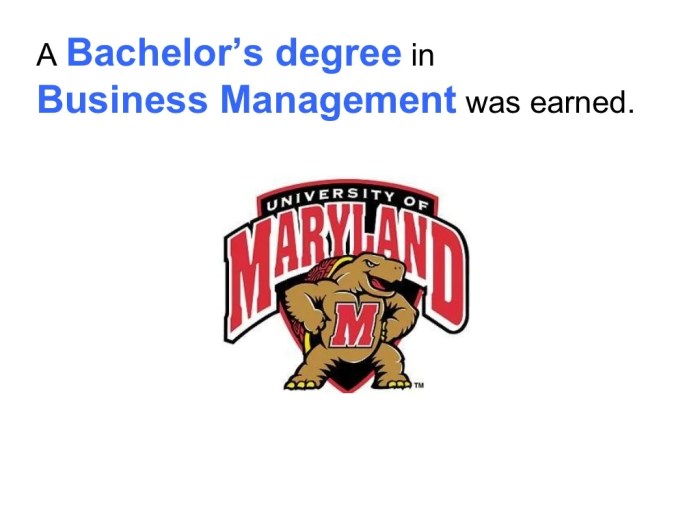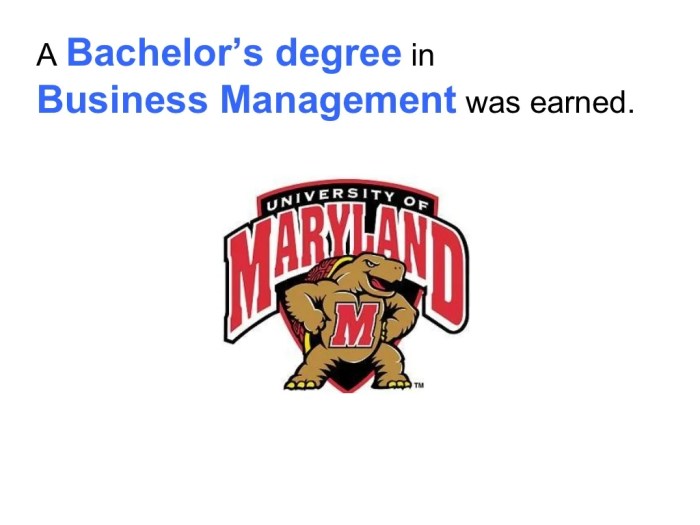An accredited online bachelor’s degree in business is a valuable credential that can open doors to exciting career opportunities. This degree equips you with the knowledge and skills to thrive in the competitive business world, regardless of your location or schedule.
Whether you’re a recent high school graduate, a career changer, or simply seeking to advance your professional prospects, an online business degree offers a flexible and accessible path to achieving your goals. From marketing and finance to management and entrepreneurship, online programs cover a wide range of business disciplines, allowing you to specialize in your area of interest.
What is an Accredited Online Bachelor’s Degree in Business?
An accredited online bachelor’s degree in business is a four-year undergraduate program that equips students with the knowledge and skills needed to succeed in various business-related roles. Accreditation signifies that the program meets rigorous quality standards set by independent organizations, ensuring that graduates are prepared for the workforce.
Benefits of an Accredited Online Bachelor’s Degree in Business
Earning an accredited online bachelor’s degree in business offers numerous advantages, including:
- Increased Earning Potential:Graduates with accredited degrees often earn higher salaries and have greater career advancement opportunities.
- Enhanced Job Prospects:Employers value accreditation as a sign of quality education and competency.
- Flexibility and Convenience:Online programs allow students to learn at their own pace and on their own schedule, making it easier to balance work, family, and education.
- Accessibility:Online programs are accessible to students from diverse backgrounds and locations, expanding educational opportunities.
- Networking Opportunities:Online programs often include opportunities for students to connect with peers and professionals in the field.
Differences Between Online and Traditional Business Degree Programs
While both online and traditional business degree programs aim to provide a comprehensive education, they differ in their delivery methods and student experiences:
- Delivery Method:Online programs utilize virtual platforms for lectures, assignments, and interactions, while traditional programs rely on in-person classes.
- Flexibility:Online programs offer greater flexibility in terms of scheduling and location, allowing students to learn at their own pace and from anywhere with an internet connection.
- Student Interaction:Online programs often incorporate online discussion forums, video conferencing, and other interactive tools to facilitate student interaction.
- Cost:Online programs may offer cost savings compared to traditional programs, as they eliminate expenses related to commuting and on-campus housing.
Examples of Reputable Online Business Degree Programs
Several reputable universities offer accredited online bachelor’s degrees in business. Some examples include:
- Arizona State University (ASU):ASU’s online bachelor’s degree in business administration is highly ranked and offers a wide range of specializations.
- University of Florida:The University of Florida’s online bachelor’s degree in business administration is known for its rigorous curriculum and strong faculty.
- Indiana University Bloomington:Indiana University Bloomington’s online bachelor’s degree in business administration offers a flexible learning environment and a focus on practical skills.
Career Paths and Job Opportunities
An online bachelor’s degree in business opens doors to a wide range of career paths and job opportunities across various industries. Graduates with this degree are highly sought after by employers who value their analytical, communication, and problem-solving skills.
Many universities offer a variety of online master degree programs in social work , catering to different specializations and career paths. From clinical social work to macro social work, these programs provide the knowledge and skills you need to make a positive impact on individuals, families, and communities.
Job Market Trends and Demand for Business Professionals
The job market for business professionals is constantly evolving, driven by technological advancements, globalization, and changing consumer preferences. However, the demand for skilled business professionals remains strong, with several sectors experiencing significant growth.
Common Career Paths
An online bachelor’s degree in business equips graduates with the knowledge and skills necessary to succeed in various roles. Here are some common career paths:
Management and Leadership
- Operations Manager: Oversee the day-to-day operations of a business, ensuring efficiency and effectiveness.
- Project Manager: Plan, organize, and execute projects within budget and time constraints.
- Sales Manager: Lead and motivate sales teams to achieve revenue targets.
- Marketing Manager: Develop and implement marketing strategies to promote products and services.
Finance and Accounting
- Financial Analyst: Analyze financial data, prepare reports, and provide recommendations to improve financial performance.
- Accountant: Manage financial records, prepare tax returns, and ensure compliance with accounting standards.
- Budget Analyst: Develop and monitor budgets, ensuring efficient allocation of resources.
Human Resources
- Human Resources Manager: Oversee all aspects of employee relations, including recruitment, training, and compensation.
- Compensation and Benefits Specialist: Design and administer compensation and benefits programs.
- Training and Development Specialist: Develop and deliver training programs to enhance employee skills.
Sales and Marketing
- Sales Representative: Generate leads, build relationships with clients, and close sales.
- Marketing Specialist: Create and implement marketing campaigns, analyze market trends, and manage social media presence.
- Public Relations Specialist: Manage public image and relationships with media outlets.
Entrepreneurship
- Business Owner: Start and operate their own business, leveraging their business knowledge and skills.
- Entrepreneur: Identify and capitalize on business opportunities, developing innovative products or services.
Industries that Hire Business Graduates
Graduates with an online bachelor’s degree in business are sought after by a wide range of industries, including:
- Finance and Banking: Financial institutions, investment firms, and insurance companies.
- Technology: Software development companies, tech startups, and e-commerce businesses.
- Healthcare: Hospitals, healthcare providers, and pharmaceutical companies.
- Retail: Department stores, online retailers, and consumer goods companies.
- Manufacturing: Manufacturing companies, industrial equipment suppliers, and automotive manufacturers.
- Government and Non-profit: Government agencies, non-profit organizations, and educational institutions.
Potential Salary and Career Advancement Opportunities
The salary potential for business professionals with an online bachelor’s degree varies depending on factors such as industry, experience, and location. However, the average starting salary for business graduates is competitive, and there are significant opportunities for career advancement.
“According to the U.S. Bureau of Labor Statistics, the median annual salary for management occupations was $107,640 in May 2021.”
“The median annual salary for financial analysts was $86,080 in May 2021.”
With experience and continued education, business professionals can advance into leadership positions, such as director, vice president, or CEO.
If you’re looking to advance your career in social work, consider pursuing an MSW degree online accredited programs. These programs offer flexibility and convenience, allowing you to study at your own pace while maintaining your current responsibilities. Accredited programs ensure you receive a high-quality education that meets industry standards, preparing you for a rewarding career in social work.
Cost and Financial Aid Options
The cost of an accredited online bachelor’s degree in business can vary significantly depending on the institution, program length, and other factors. Understanding the potential costs and available financial aid options is crucial for making informed decisions about your education.
Average Cost of an Online Bachelor’s Degree in Business
The average cost of an online bachelor’s degree in business can range from $20,000 to $80,000, depending on the factors mentioned above. Here are some key cost considerations:
- Tuition Fees:This is the primary expense and can vary widely between institutions. Some universities charge per credit hour, while others offer flat-rate tuition per semester. Public universities typically have lower tuition rates than private institutions.
- Program Length:A typical bachelor’s degree program takes four years to complete. However, some online programs may be accelerated, allowing you to graduate in less time, which can save on tuition costs.
- Books and Materials:These costs can vary depending on the specific courses you take. Online programs often use digital materials, which may be included in tuition fees.
- Technology:You may need to invest in a reliable computer, internet access, and other technology to support your online learning experience. Some institutions may provide stipends or discounts on technology.
Financial Aid Options for Online Business Students
There are numerous financial aid options available to help you pay for your online business degree. These options can include:
- Scholarships:Scholarships are often awarded based on academic merit, financial need, or specific criteria such as major or ethnicity. Many scholarships are available specifically for online students.
- Grants:Grants are similar to scholarships but are usually based on financial need. Unlike loans, grants do not need to be repaid.
- Federal Student Loans:Federal student loans offer lower interest rates and more flexible repayment options than private loans. There are various federal loan programs available, including the Stafford Loan and the Perkins Loan.
- Private Student Loans:Private student loans are offered by banks and other private lenders. These loans typically have higher interest rates than federal loans and may require a co-signer.
- Employer Tuition Assistance:Some employers offer tuition assistance programs to their employees, which can help cover the cost of education.
Managing the Cost of Education and Maximizing Financial Aid Opportunities
- Start Early:Begin researching financial aid options early in the application process.
- Complete the FAFSA:The Free Application for Federal Student Aid (FAFSA) is the primary application for federal student aid.
- Explore Scholarships:Use online scholarship search engines and contact your chosen institution’s financial aid office for scholarship opportunities.
- Budgeting and Financial Planning:Create a budget to track your expenses and income. Consider working part-time to help offset the cost of education.
Tips for Success in Online Learning: Accredited Online Bachelor’s Degree In Business

Earning an online bachelor’s degree in business requires dedication, discipline, and strategic planning. Unlike traditional classroom settings, online learning demands proactive engagement and effective time management. Here are some key strategies to ensure success in your online business program:
Effective Time Management
Time management is crucial for balancing work, personal life, and studies.
- Create a Schedule:Develop a consistent schedule that allocates specific time slots for studying, attending live sessions, completing assignments, and taking breaks. Stick to your schedule as much as possible to maintain momentum and avoid procrastination.
- Prioritize Tasks:Use a planner or task management app to list your assignments, deadlines, and other commitments. Prioritize tasks based on urgency and importance, focusing on high-priority items first.
- Break Down Large Tasks:Divide large assignments or projects into smaller, manageable chunks. This approach makes the workload feel less overwhelming and allows you to track progress more effectively.
- Avoid Multitasking:While it may seem efficient, multitasking can actually decrease productivity. Focus on one task at a time to avoid distractions and improve concentration.
Effective Study Habits
Developing effective study habits is essential for absorbing information and retaining knowledge.
- Active Learning:Instead of passively reading materials, engage actively with the content. Take notes, highlight key points, ask questions, and participate in discussions. This approach enhances understanding and memory retention.
- Regular Review:Schedule regular review sessions to reinforce what you’ve learned. Revisit notes, complete practice exercises, and engage in self-assessment to identify areas that need further attention.
- Create a Dedicated Study Space:Designate a quiet and comfortable space for studying. Minimize distractions by turning off notifications, closing unnecessary tabs, and informing family members of your study time.
- Take Breaks:Regular breaks are essential for maintaining focus and preventing burnout. Step away from your screen every hour or so to stretch, walk around, or engage in a relaxing activity.
Communication Skills
Strong communication skills are essential for online learning.
- Active Participation:Engage actively in discussions, forums, and online meetings. Ask questions, share your thoughts, and participate in group projects to enhance your understanding and build connections with your peers and instructors.
- Clear and Concise Communication:When communicating with instructors, classmates, or peers, use clear and concise language. Avoid jargon and ensure your messages are easy to understand.
- Professional Etiquette:Follow professional communication etiquette when interacting with instructors and peers. Use proper grammar and spelling, and avoid slang or informal language.
- Prompt Responses:Respond to messages and emails promptly to maintain communication flow and ensure you don’t miss important information.
Active Participation and Engagement
Active participation and engagement are crucial for online learning success.
- Attend Live Sessions:Participate in live sessions, ask questions, and contribute to discussions. This approach allows you to interact directly with your instructors and classmates, fostering a sense of community and engagement.
- Engage in Online Discussions:Participate actively in online forums and discussions. Share your insights, ask questions, and engage with your peers to deepen your understanding of the course material.
- Seek Feedback:Regularly seek feedback from instructors and peers to identify areas for improvement. Use their insights to refine your work and enhance your learning process.
- Collaborate with Peers:Connect with your classmates online. Form study groups, share resources, and collaborate on assignments to enhance your learning experience and build a support network.
Seeking Support, Accredited online bachelor’s degree in business
Don’t hesitate to seek support when needed.
- Contact Instructors:Reach out to your instructors with any questions or concerns. They are there to guide you and provide assistance throughout your learning journey.
- Utilize Online Resources:Take advantage of the online resources provided by your institution, such as online libraries, tutoring services, and academic support centers.
- Connect with Peers:Build relationships with your classmates and form study groups. Peer support can provide valuable insights, motivation, and encouragement.
Concluding Remarks

Pursuing an accredited online bachelor’s degree in business is a smart investment in your future. By choosing the right program and committing to your studies, you can gain the knowledge, skills, and credentials needed to succeed in today’s dynamic business landscape.
